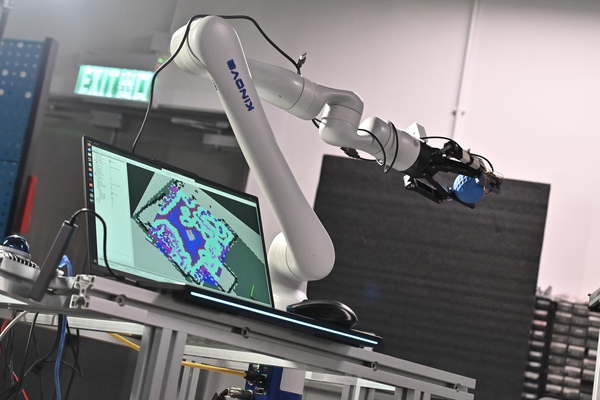HK Reaches For The Moon

The beauty and mystery of the Moon have captivated the human imagination for millennia. Channelling that fascination into scientific discovery, China launched its lunar exploration programme in 2004.
Chang'E-8, part of the programme's fourth phase, is scheduled to be launched around 2028 to lay the groundwork for the construction of a China-led international lunar research station.
The Hong Kong University of Science & Technology (HKUST) has been appointed by the China National Space Administration to lead an international collaboration project under Chang'E-8 and develop a multifunctional lunar surface robot for scientific exploration.
Multifunctional role
HKUST Space Science & Technology Institute Director Prof Yu Hongyu explained that the robot is equipped with dual robotic arms and is capable of deploying and installing instruments, collecting lunar surface samples and more.
After the Chang'E-8 probe lands, the robot will need to retrieve other probes or sensors from it and move them to their designated locations.
“Precise control of the robotic arms is a challenging task. The process requires avoiding collisions with other instruments and positional accuracy.”
The Moon’s extreme temperatures and lack of satellite navigation systems pose additional challenges, so the robot is designed to perceive the topography of the Moon, plan and change its paths accordingly.
“In response to the Moon's low-gravity and harsh environmental conditions, we are developing a software to ensure that the robot can autonomously adapt its posture and functions based on the environmental changes,” Prof Yu added.
Another key feature of the robot is its ability to serve as a mobile charging station to charge various lunar surface equipment.
“In the future International Lunar Research Station, there will be several robots and instruments working collaboratively. They require a stable energy supply. Our robot, fitted with solar panels, can provide wireless charging capabilities,” Prof Yu elaborated.
Lunar linkup
To complete the international collaboration project, the Government has established the Hong Kong Space Robotics & Energy Centre under the InnoHK Research Clusters.
Led by HKUST, the centre brings together researchers from the local and mainland universities, the Shanghai Academy of Spaceflight Technology as well as the South African National Space Agency.
The Innovation & Technology Commission estimates that the centre will provide training for around 20 PhD students and employ over 70 researchers in related fields. It aims to build Hong Kong's aerospace technology capabilities, driving innovation from concept, research, production, testing to system integration.
As aerospace technology is a multidisciplinary field, the centre will not only enhance Hong Kong’s aerospace research and engineering capabilities, but also generate industry impact for sectors such as engineering, microelectronics, artificial intelligence, computing and communications, promoting their development.
Strong support
Noting that Hong Kong has a solid foundation in basic research and development (R&D), Secretary for Innovation, Technology & Industry Prof Sun Dong said the Government strongly backs local universities and research institutions in conducting aerospace technology-related research and supporting the country to become the world’s leading spacefaring nation.
He noted that the centre will capitalise on Hong Kong’s distinct advantages under “one country, two systems”, enhancing the city’s R&D capabilities and international scientific reputation.
“In recent years, China has achieved remarkable accomplishments in the field of deep space exploration. The level of deep space exploration capability is an important indicator of a country's scientific and technological strength.
“Through deeply engaging in national space missions and strengthening international scientific and technological co-operation, the centre will facilitate the transformation and application of cutting-edge technologies related to aerospace, significantly enhance Hong Kong’s global competitiveness in the aerospace field and propel its advancement as an international innovation and technology centre.”
Prof Sun also pointed out that the Government has started to establish the third InnoHK research cluster focusing on advanced manufacturing, materials, energy and sustainable development.
Care Teams Selfless Aid Applauded
Mr Tong and his family of four live in an old building in Cheung Sha Wan where a fire previously broke out in their bu... Read more
New Hub Helps Green Tech To Flourish
Last month, the Hong Kong Science & Technology Parks Corporation, or HKSTP, transformed its InnoCentre in Kowloon ... Read more
MICE Tourism Gains Momentum
Ballroom inspections and mahjong sessions may not be what automatically springs to mind when you consider Hong Kong’... Read more
Game Startups Reach New Level
The global video game industry is highly competitive, requiring effective marketing for success. The Hong Kong Game En... Read more
Breast Milk Donations Save Lives
Last April, Ida Chan welcomed her son into the world. He was born a kilogramme lighter than expected, and Ida decided ... Read more
Creating Disability-inclusive Jobs
Nestled in the Museum of the War of Resistance & Coastal Defence, Madam Hong Cafe enjoys the spectacular views of ... Read more

